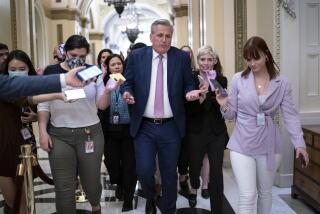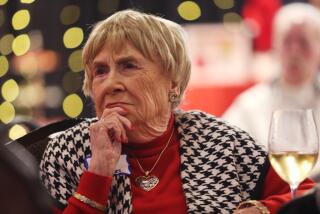‘Tough,’ ‘Decent’ Teamsters Chief Takes Union Reins at Pivotal Time
- Share via
“To understand Billy McCarthy, you have to understand that he grew up in an era when companies hired goons and broke heads to prevent their workers from unionizing,” said a young Massachusetts labor leader asked to describe William J. McCarthy, who last week was elected president of the 1.6-million-member Teamsters Union.
“He’s a very tough character. He had to be,” said David Brenner, president of the Boston local of the Laundry and Dry Cleaning International Union.
But Brenner quickly added, anticipating a frequent question about Teamster leaders: “The last thing I would want to imply is that he’s connected to organized crime. There’s nothing to suggest that.”
Tommy Evers, former president of the Massachusetts State Building Trades Council, described McCarthy as “a decent, hard-working guy; that’s what they need.”
Likely to Be Scrutinized
McCarthy, 69, has headed Teamster Local 25 in Boston since 1955 and been an international vice president of the union since 1969. However, he was virtually unknown outside his home state until Friday. McCarthy is now likely to be one of the most scrutinized labor leaders in history.
He has assumed the helm of the Teamsters at a pivotal moment in the union’s history. Last month, the Justice Department filed an unprecedented lawsuit under the Racketeer Influenced and Corrupt Organizations Act (RICO) seeking to take over the union in an effort to sever what the government alleges are longtime ties to organized crime. In a trial that is scheduled to begin in February, the government will attempt to impose a trusteeship over the Teamsters, and keep it in place until “free and fair elections” can be held to choose new union leaders.
McCarthy, like all 17 other members of the union’s executive board, is a defendant in that suit. The suit asserts that the members of the board “flagrantly abdicated” their responsibility to eliminate corruption in the union, a charge the Teamster leaders deny and will vigorously contest in federal court.
This week McCarthy will convene a meeting of Teamster lawyers to plan strategy for the upcoming case, which is clearly one of the most formidable challenges he faces as president of the nation’s most scandal-ridden union. Three of his six predecessors--Dave Beck, Jimmy Hoffa and Roy L. Williams--were convicted of federal crimes and the man he replaced, Jackie Presser, was under a federal indictment when he died.
But the RICO suit is hardly McCarthy’s only challenge. He faces an increasingly restive membership, whose ranks have been reduced and many of whose paychecks and benefits have been slashed in the buffeting the union has taken in the deregulation of the trucking industry over the past decade.
Began as Driver
The Teamsters and the trucking industry have changed considerably since 1936, when the 17-year-old McCarthy joined the union as a driver for Benjamin Express. Within a few years, he moved on to a new job with M&M; Trucking Co. In 1941, McCarthy took his first union assignment as a steward, monitoring contract enforcement. He served in the Army during World War II.
A native of Boston’s working-class Charlestown neighborhood, McCarthy caught the eye of John F. English, a longtime Teamster leader from South Boston who served as secretary-treasurer under three Teamster presidents. In 1947, McCarthy was elected a Local 25 business agent, the youngest person ever voted to such a position with the Teamsters.
Eight years later, he was elected president of Local 25 and has held that position ever since. Then, in 1964 he was elected secretary-treasurer of Teamster Joint Council 10, which is composed of Teamster locals in all five New England states. Not long afterward, he became the joint council president and still holds that position too.
Hoffa appointed McCarthy to fill a vacancy on the union’s international executive board on March 1, 1969. He was elected to his first full term on the board at the union’s 1971 convention and reelected at five-year intervals since. He ranked third in seniority among Teamster vice presidents before his colleagues chose him by a 9-8 margin over union Secretary-Treasurer Weldon L. Mathis to replace Presser.
McCarthy’s election “is a historic moment for the Teamsters international bringing the presidency back to its roots,” said George Cashman, a business agent for Local 25, referring to the Boston origins of the union’s first two presidents, Cornelius Shea and Daniel Tobin. The latter served from 1907 to 1952 and was a close ally of President Franklin D. Roosevelt.
Some Question Breadth
The new president has not spent a great deal of time outside New England and there are some who question whether he has the breadth for the job. “He’s smart in a street way,” said one Teamster local president who spoke on condition of anonymity. “The drawback is he considers pounding on employers and handling grievances the extent of the job. He has no broad vision of where the union should go in the next few years.”
In at least one respect though, the same man said that McCarthy is particularly well-positioned to gain the support of the union’s membership. Earlier this year, in a highly unusual move, he publicly opposed ratification of the union’s key contract, the national master freight agreement, asserting that it gave up too much to the trucking companies.
Nearly 64% of the drivers who cast ballots on the pact voted against it, but the contract went into effect because an unusual provision in the Teamster constitution provides that a contract agreed to by union negotiators is ratified unless it is rejected by two-thirds of those voting. There is now substantial sentiment in the union to have the rule overturned and replaced with one providing for ratification only if a majority approves a contract.
At his first news conference as president Friday, McCarthy said he would do “whatever I can” to improve the agreement, but it is unclear what that would be. Trucking executives have indicated they consider him a tough negotiator who is a man of his word, as do his own members.
“He demonstrates tenacity and a willingness to continue in negotiations when others would give up,” said Cashman, 39, the Local 25 business agent who’s been a Teamster for 21 years. “I can’t see anything occurring but positive things from his leadership.”
‘He Plays Hardball’
Dominic Bozzotto, president of the Hotel Employee and Restaurant Employees local in Boston, called McCarthy “tough. He plays hardball in his local. That’s how you get to be president and get things done.” But Bozzotto presented another side of McCarthy, too. He said that shortly after he became president of his local in 1981 he was going to his first meeting as the trustee of a union pension fund and had many questions about complicated issues he had never before encountered. Bozzotto said the conversation he had with McCarthy on pensions “was the most fact-filled 20 minutes I’ve ever spent with anybody.”
One of the major complicated problems McCarthy has before him is healing the wounds of the bruising battle he and Mathis waged to succeed Presser. Several of the board members who opposed McCarthy did not come to his news conference. And several sources said there was considerable bitterness at what had transpired.
McCarthy emerged very late in the race to become the new Teamsters president. This spring, Mathis’ leading opponent was Walter Shea. An articulate, well-dressed man who was appointed to the Panama Canal Commission by President Reagan, Shea is considered the most polished Teamster vice president. But he has never been president of a local union and several of his colleagues said they would not support him because he had not had to face some of the heat that inevitably goes with one of those jobs.
So, Joseph Trerotola, a New Yorker, who is the Teamster board’s senior member and a bitter foe of Mathis, began looking for another candidate and McCarthy was ready to throw his hat into the ring. He started with five solid votes and gradually picked up four others, some because they disliked Mathis and others, a source said, out of loyalty to Trerotola, known to his friends as “Joe T.”
Asked why McCarthy had won, one Teamster leader said: “He was anybody but Mathis.”
McCarthy will be paid $225,000 a year as Teamster president. It is not clear whether he will retain three other Teamster jobs, including the presidency of his 8,500-member local, which could pay him an additional $79,400. In either case, McCarthy probably will be considerably less flamboyant than Presser, a 300-pound man who described himself as a millionaire, drove a Cadillac and once posed for a photograph holding a cigarette lighter designed in the shape of a blow torch.
Cashman said McCarthy was “fiscally very conservative” and had an “extremely modest office” at Local 25. Another union leader noted “some Teamster officials drive Cadillacs. McCarthy and all his business agents drive black Ford LTDs.
More to Read
Sign up for Essential California
The most important California stories and recommendations in your inbox every morning.
You may occasionally receive promotional content from the Los Angeles Times.









